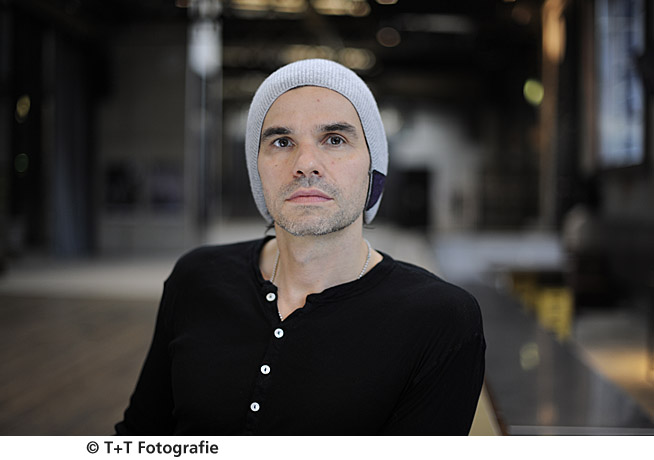塞巴斯蒂安·鲍姆加登(Sebastian Baumgarten)
塞巴斯蒂安·鲍姆加登1969年1月31日生于东柏林。他的母亲是一名歌手,他的父亲是一位医生,他的祖父曾是柏林国家歌剧院的艺术总监。学业开始三年后,他转学到Georg Friedrich Händel文法学校读书,这是一所音乐特色专业学校。1989年,他高中毕业并在国家人民军服兵役后,他开始了在汉斯·艾斯勒音乐学院学习导演课程。
自1990年起,鲍姆加登担任Ruth Berghaus,Einar Schleef和Robert Wilson三人的助理。他在各大城市的剧院里工作,包括汉堡、维也纳、柏林和苏黎世,并从1992年起开始独立执导作品。1999年至2002年,他卡塞尔国家剧院担任高级戏剧导演和歌剧副导演。2003年至2005年,他在梅宁根剧院担任歌剧和戏剧总导演。2002年,塞巴斯蒂安·鲍姆加登在卡塞尔国家剧院以作品普契尼的《“托斯卡”》荣获格茨·弗里德里希奖。2006年,他获得年度歌剧导演荣誉。所有当过Ruth Berghaus,Einar Schleef和Robert Wilson助理导演的人都会成为一名歌剧导演或戏剧导演,但塞巴斯蒂安·鲍姆加登两者兼备。但是他早期的职业生涯与其他同事,诸如Jossi Wieler 或Sebastian Nübling。鲍姆加登从歌剧导演起步,这原本显然意味着他所获得的所有的训练都是有关于音乐戏剧的,因此他注定会成为一名歌剧导演。然而,他对待歌剧的态度如同他进入戏剧行业一样,非同寻常。迄今为止,鲍姆加登质疑了传统的歌剧美学,并把歌剧拒绝接受的自由化的东西植入戏剧舞台。这显然也是从他当前的立场获得的视野。毕竟,鲍姆加登是最具智慧的德国导演之一,并且当他把他的导演理念转化为现实的时候,他对政治和历史境况怀有浓厚的兴趣。
例如,当他在曼海姆导演歌德的《埃曼特》(Egmont)时,他把史诗的主线精简为故事性的情节,并不断插入用冷静的百科全书式的语言来介绍背景的新片段来介绍当时的历史语境,使歌德的剧作更加紧凑。鲍姆加登把这个16世纪发生在荷兰的宗教战争的传说,用引用乔治·阿甘本著作中的语言和强调我们民主政体中的干扰因素来点缀穿插,引入当代世界。鲍姆加登倡导一种先进的导演理念,但是不支持戏剧本体的消解。他寻求的是在舞台上塑造历史和政治的反思,使他的观众在他的引导下进行思考。用这种方式,他使自己陷入了非常严苛的批评之中。当他2007年末在杜塞尔多夫剧院把拉斯·冯·特里尔的《欧罗巴》改编成舞台剧的时候,他被职责为没能发挥全部的戏剧原创才能,“仅仅做了一个政治批评注脚的戏剧”。
鲍姆加登曾经在接受采访时说过,他只有在戏剧的物质形态从它所依据的文本中解放出来才感到满意。用他的话说,人们可以听到,他戏剧导演有时候会痛骂歌剧规范的局限性,他在柏林人民剧院上演的一部音乐话剧版《托斯卡》(Tosca)把歌剧和戏剧的手法合并到一起。他不仅吸收了普契尼歌剧的歌词,还运用了维多利亚·萨尔多的《拉·托斯卡》,自然而然地消解了戏剧和歌剧之间的界限。他将继续在往这个方向探索戏剧方式。但是这还要看他哪天能够再次担任高级管理职位,正如他当年在开塞尔和梅宁根剧院时同时兼任高级歌剧导演和戏剧总导演一样。
Sebastian Baumgarten
Sebastian Baumgarten was born on 31 January 1969 in East Berlin. His mother was a singer, his father a doctor, his grandfather artistic director of the Staatsoper unter den Linden. Three years after starting school, he transferred to the Georg Friedrich Händel Grammar School, which specialised in musical education. In 1989, after completing his Abitur (school-leaving certificate giving right of entry to university) and military service in the National People’s Army, he began a course in directing at the Hanns Eisler Academy of Music.
From 1990 on, Baumgarten was employed as an assistant to Ruth Berghaus, Einar Schleef and Robert Wilson. He worked at theatres in various cities, including Hamburg, Vienna, Berlin and Zurich, and started directing plays on his own account in 1992. From 1999 to 2002, he was senior director of drama and deputy director of opera at the Staatstheater Kassel. From 2003 to 2005, he was director-in-chief of the opera and theatre companies at Theater Meiningen. In 2002, Sebastian Baumgarten was awarded the Götz Friedrich Prize for his production of Puccini’s Tosca at the Staatstheater Kassel. In 2006,he was named Opera Director of the Year.Anyone who has worked as an assistant director to Ruth Berghaus, Einar Schleef and Robert Wilson is going to be either an opera director or theatre director. Sebastian Baumgarten has become both, but the early stages of his career were very different from those of colleagues like Jossi Wieler or Sebastian Nübling. Baumgarten began by directing operas, which was an obvious step given that his whole training was concerned with musical theatre and he seemed destined to be an avowed opera director. However, his attitude to opera is just as unusual as his route into the theatre. To the present, Baumgarten questions the traditional aesthetic of the opera and looks to drama for the freedoms that opera denies.This too is an obvious move from his current standpoint. After all, Baumgarten
is one of the intellectuals among German directors and has a strong interest in
discussing political and historical conditions when he translates his directorial
ideas into reality.
For example, when he directed Goethe's Egmont in Mannheim, he cut the historical epic down to its plotline and explained historical contexts by inserting new passages of text that set out the background to the play in the calm diction of an encyclopaedia, which gave Goethe's text a tighter focus. Baumgarten brought this tale of the 16th-century Dutch wars of religion into the modern world by interspersing it with quotations from Giorgio Agamben and highlighting the disturbing condition of our democratic political systems. Baumgarten advocates an advanced concept of directing, but does not stand for a theatre of deconstruction. He seeks to foster historical and political reflection on the stage and relies on his audience allowing itself to be seduced into thought. By taking this approach, he is letting himself in for some pretty harsh criticism. When he adapted Lars von Trier's Europa for the stage at the Düsseldorf Schauspielhaus in late 2007, he was accused of not having exploited the full dramatic potential of the original and merely creating "a theatre of critical political footnotes".
Sebastian Baumgarten once said in an interview that he is only satisfied once the stage material has emancipated itself from the text on which it is based. In his words, one could hear the theatre director who occasionally rails against the narrow limits of the opera and brought the two streams of his work together in one of his recent productions when he staged a musical spoken theatre version of Tosca at the Berlin Volksbühne. He not only drew on the libretto of Puccini's opera, but also on Victorien Sardou's play La Tosca, while simultaneously blurring the borderline between drama and opera. He will carry on experimenting in this direction. However, it remains to be seen whether he will some day take on senior managerial duties again as he has in the past at Kassel and Meiningen, where he was responsible for both theatre and opera as senior director of drama and director-in-chief.


